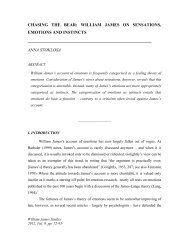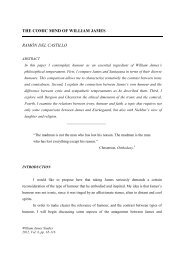POLITICS IN THE PLURIVERSE. By Kennan Ferguson
POLITICS IN THE PLURIVERSE. By Kennan Ferguson
POLITICS IN THE PLURIVERSE. By Kennan Ferguson
Create successful ePaper yourself
Turn your PDF publications into a flip-book with our unique Google optimized e-Paper software.
REVIEWS 135<br />
Another option is to see James not as moving beyond liberalism descriptivism<br />
about pluralism but rather only the liberal attempt to subsume of pluralism in a higher<br />
unity. Rawls’s liberalism professes to describe a fact of “reasonable” pluralism, but a<br />
better name may have been “shallow” pluralism. James, by contrast to Rawls but in<br />
anticipation of later liberals like Isaiah Berlin, accepts the irreducible fact of “deep”<br />
pluralism. One need not prescribe deep pluralism to descriptively accept it as an<br />
unavoidable condition of our political modernity. James can thus be seen as rejecting any<br />
liberal attempt to subsume plurality in a greater unity without being seen as prescribing<br />
pluralism. This raises the possibility that perhaps <strong>Ferguson</strong> attributes to liberalism a view<br />
which describes only some, but certainly not all, liberals.<br />
If the core issue at stake in Jamesian versus liberal pluralism is not that of<br />
prescriptivism and descriptivism, but rather that of subsuming plurality under unity then<br />
we ought to assess <strong>Ferguson</strong>’s interpretation of liberalism in terms of this issue. I find<br />
<strong>Ferguson</strong> insightful in his diagnosis of a prevalent “statism” in contemporary liberal<br />
theory according to which liberal pluralists aim to subsume plurality under the unity of<br />
the state. But does this diagnosis really extend to all liberal pluralists? It surely describes<br />
the liberal pluralism of John Rawls and the tidal wave of work which it washed in. But<br />
does it capture Isaiah Berlin, Bernard Williams, Amartya Sen, and Martha Nussbaum as<br />
precisely as it does Rawls? Does it even come close to describing John Dewey?<br />
<strong>Ferguson</strong> seems to suggest as much. But I worry that liberalism is here being painted<br />
with too big a brush. This little review is not the appropriate venue for a pointillist<br />
rendering of liberalism in enormous detail, so let me just register a worry that some may<br />
have about <strong>Ferguson</strong>’s argument: liberalism for some is sufficiently capacious to<br />
accommodate Jamesian pluralism as <strong>Ferguson</strong> develops it. If this is correct, then<br />
Jamesian pluralism is perhaps not an alternative solution to the ills of liberalism so much<br />
as a statement of the work that liberalism now ought to engage itself in and, in the case of<br />
at least a few contemporary theorists, is already attempting. James’s pluralism is perhaps<br />
a viable path forward, but I think it unnecessary and unpragmatic (in the colloquial sense)<br />
to suggest that it is an anti-liberal path. So here is a suggestion: replace “liberalism” with<br />
“statism” in <strong>Ferguson</strong>’s argument and there you have a nice liberal pluralist argument<br />
against liberal statism.




